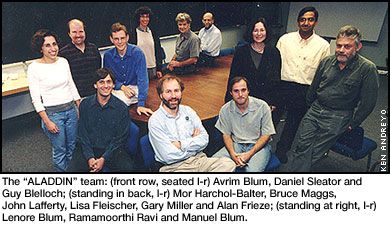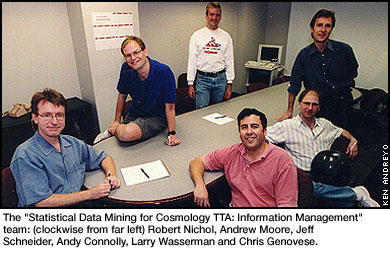|
|
||
|
|
|
 NSF Grants SCS Faculty More Than $24 Million to Help Fund Research
NSF Grants SCS Faculty More Than $24 Million to Help Fund Research
The National Science Foundation (NSF) has awarded faculty in the School of Computer Science more than $24 million in grants from its Information Technology Research (ITR) Initiative.
The 14 awards to Carnegie Mellon faculty, announced by NSF Director Rita Colwell in late September, are part of a $156 million program established to maintain U.S. leadership in computer science and its applications. The program is also geared to promote fundamental research and innovative uses of information technology (IT) in science and engineering.
"Our objective is to support the development of software and IT services that will help scientists and engineers make the kinds of discoveries that will eventually be applied by industry," Colwell said.
One of the largest awards, totaling more than $5.6 million over five years, was made to the Computer Science Department's Guy Blelloch, Daniel Sleator, Ramamoorthi Ravi and Manuel, Avrim and Lenore Blum, who submitted a proposal titled "ALADDIN: A Center for Algorithm Adaption, Dissemination and Integration." Research team members also include Mor Harchol-Balter, Bruce Maggs, John Lafferty, Lisa Fleischer, Gary Miller and Alan Frieze.
Blelloch said the project is intended to shorten the gap between theoretical algorithm research and the use of algorithms in applications. He said these gaps, which range from 10 to 30 years, result from a lack of communication between researcher and application developers.
"It's really a communications gap," Blelloch told Computerworld magazine. He said a large part of the grant would be aimed at bringing researchers and developers together in various ways including workshops.
"The grant is in essence for 'Mining the Sky'-getting computers to search through terabytes of data from large scale surveys of the universe in order to find useful patterns and anomalies," said Moore, the Nico Haberman professor of computer science and robotics.
"It's an especially fun project because it simply can't work without three kinds of people working closely together. You've got to have the physicists (Connolly and Nichol) to guide the big picture and decide what are the useful patterns to pursue. You've got to have the statisticians (Genovese and Wasserman) to deal with what patterns and structures are meaningful and how to best detect them. And you've got to have the computer scientists (Moore and Schneider) to make this kind of massive automated science tractable.
"It's taken us three years of working closely together to make this relationship really work," Moore said.
Other Carnegie Mellon research projects that received funding from the NSF ITR program are:
• "Cognitive and Social Design of Robotic Assistants" by Sara Kiesler, Jodi Forlizzi and Sebastian Thrun ($3.2 million over five years)
• "Avenue: Adaptable Voice Translation for Minority Languages" by Jaime Carbonell, John Lafferty, Alexander Waibel, Lorraine Levin and Alon Lavie ($2.5 million over five years)
• "Capturing, Coordinating and Remembering Human Experience" by Howard Wactlar, Michael Christel, Alex Hauptmann and Takeo Kanade ($2 million over five years)
• "Language Technology for Trustless Software Dissemination" by Karl Crary, Robert Harper, Peter Lee and Frank Pfenning ($1.7 million over five years)
• "Augmented Cognition: Combining Human and Digital Memory" by Randy Pausch ($1.2 million over five years)
• "Foundations of Electronic Marketplaces: Game Theory, Algorithms and Systems" by Tuomas Sandholm and Avrim Blum ($1.2 million over five years)
• "Situationally Appropriate Interaction" by Scott Hudson, Chris Atkeson and Jie Yang ($1,050,000 over five years)
• "Verification Tools for Autonomous and Embedded Systems" by Edmund Clarke, Randy Bryant, Jeannette Wing, Reid Simmons, David Garlan and Bruce Krogh ($1 million over three years)
Projects that received funding of less than $1 million are:
• "Tutoring Explanation and Discovery Learning: Achieving Deep Understanding through Tutorial Dialog" by Vincent Aleven and Ken Koedinger ($394,000 over three years)
• "Compositional Connectors" by David Garlan ($420,000 over three years)
• "The Million Book Project" by Raj Reddy and Gloriana St. Clair ($500,000 for one year)
• "Course Capsules: Persistent, Personalized Courseware" by Klaus Sutner, Michael Kohlhase, Peter Lee, Dana Scott and Joel Smith ($424,000 over three years)
More information on the NSF ITR grants can be found at www.itr.nsf.gov/awds/.
Anne Watzman
|
|
This Issue's Headlines || Carnegie Mellon News Home || Carnegie Mellon Home |
||
 The second largest grant, $3.4 million over five years, was given to Andrew Moore, Jeff Schneider, Robert Nichol, Andy Connolly, Larry Wasserman and Chris Genovese for their interdisciplinary project "Statistical Data Mining for Cosmology TTA: Information Management."
The second largest grant, $3.4 million over five years, was given to Andrew Moore, Jeff Schneider, Robert Nichol, Andy Connolly, Larry Wasserman and Chris Genovese for their interdisciplinary project "Statistical Data Mining for Cosmology TTA: Information Management."